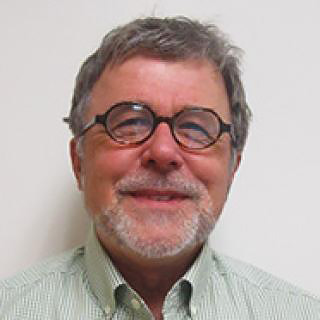Russell Glasgow, PhD, director of the Dissemination & Implementation Science Program at the Adult and Child Center for Outcomes Research & Delivery Science (ACCORDS) and University of Colorado Cancer Center member, co-authored a paper detailing the work and evolution of the Colorado Implementation Science Center in Cancer Control (COISC3).
The COISC3 is one of seven National Cancer Institute (NCI)-funded Implementation Science Centers in Cancer Control (ISC3). These centers differ from traditional research center grants in that they focus on innovative pilot research and development of implementation science methods, which improve the quality and effectiveness of health care by promoting the routine use of research findings and other evidence-based practices, rather than large trials.
Glasgow and his co-authors Bryan Ford, MPH, program manager for COISC3, and Cathy Bradley, PhD, dean of the Colorado School of Public Health and deputy director of the CU Cancer Center, discuss several crosscutting issues to enhance cancer prevention and control. The authors highlight the ways in which implementation science is well positioned to address these issues, the changes made to address priorities, and their charge to build implementation science capacity overall.
“I've been a cancer researcher for much of my career, and through ACCORDS and the CU Cancer Center, we've been looking for ways to focus on cancer prevention and control,” Glasgow says. “We were able to work together starting about six years ago to apply for this center grant to focus explicitly on implementation science to advance the science and practice of cancer prevention and control.”
Addressing key issues
Through literature review and project analysis, the researchers identified five needs and opportunities to advance implementation research and practice in cancer prevention and control: multi-level context; rapid, iterative adaptations; innovative approaches to engagement and health equity; costs and economic issues; and sustainability.
While the five issues were identified as topics that have been insufficiently studied, the multidisciplinary team gave particular attention to rapid, iterative adaptation and sustainability as the issues that had received the least attention.
“There are frameworks and methods for planning a program or implementing a guideline and later evaluating the results; but there has been little focus on what goes on in between, the notion of needing to adapt and modify as you go along,” Glasgow says. “Instead of this adaptation being haphazard, we've tried to focus on informing the adaptations based on both theory and the evolving data.”
The issues were focused on the context of cancer prevention and control, but the authors think these approaches and resources are also applicable to the prevention and management of many other chronic illnesses.
“It's possible to design from the outset for a program that can realistically be successfully implemented and sustained in most settings in terms of the commitment, resources, and processes required. One key issue, which is tied to iterative adaptation, is understanding and addressing the types of changes in workflow, staff member and patient needs, and cost issues that can make this more efficient and enhance sustainability,” Glasgow says.
Evolution of implementation science for cancer prevention and control in primary care
At the center’s inception, the theme was “Pragmatic implementation science approaches to cost and value in rural primary care.” The team, which includes several ACCORDS and Cancer Center researchers, as well as local and national clinical leaders and patient representatives, began with a pilot project focused on implementation of shared decision-making for lung cancer screening in rural primary care settings. The project faced numerous challenges, many due to the COVID-19 pandemic, when it became increasingly difficult to complete research.
“Most of these were low resource practices, and some of them were facing closing their doors, so they understandably had other priorities that made them less accessible. While they still valued the prevention work, they were clearly concerned about the more acute, immediate patient needs,” Glasgow says.
The project began with active partnering to test out new strategies and interventions in rural primary care settings. When the team couldn’t get out to meet with practices and patients, they needed to pivot their efforts. To continue their work during COVID, they conducted a large national survey of rural and urban primary care clinicians regarding the cancer prevention and control issues for which they would most like support.
Glasgow says the results were surprising in two ways. First, the national sample of physicians from 48 states expressed the greatest need for assistance with cancer prevention activities, primarily around healthy eating and exercise, not cancer screening and survivorship as the team expected. Secondly, there were almost identical responses across different types of primary care settings, including urban, rural, community health centers, low-resource clinics, and higher-resource centers.
“We started by approaching the practices with feasible and sustainable ideas we believed from the literature could improve practice and benefit patients,” Glasgow says. “What we learned from experience and the survey is that we needed instead to focus on the issues most pressing for the practices. Although challenging from a grant funding perspective, we now think about how we can help the practices and be more of a resource, rather than just approaching them with an idea we have.”
Building for the future
In the short term, the mechanism of funding for ISC3 centers is no longer available. Glasgow is disappointed but believes that COISC3 and the other centers achieved what they set out to do and collectively made a difference in cancer prevention and control. The COISC3 funding was fundamental to helping the team, led by Glasgow and Dan Matlock, MD, MPH, professor in the Division of Geriatrics, obtain funding for many of their approaches and resources though the recently awarded Anschutz Acceleration Initiative.
The ISC3 center grants were unique in that they focused on innovative and rapid pilot research and required ‘public goods’ as ways to build the field.
“The funders defined public good as things that improve the capacity for cancer prevention and control through having resources in implementation science. These are things like web tools, trainings, and collaborations, innovative implementation strategies, and publicly available pragmatic measures,” Glasgow says. “There is more than just the research that we did locally; we're also contributing to the greater good. We are building the field so that these resources will live on for both research and of practice and illness prevention and control.”




